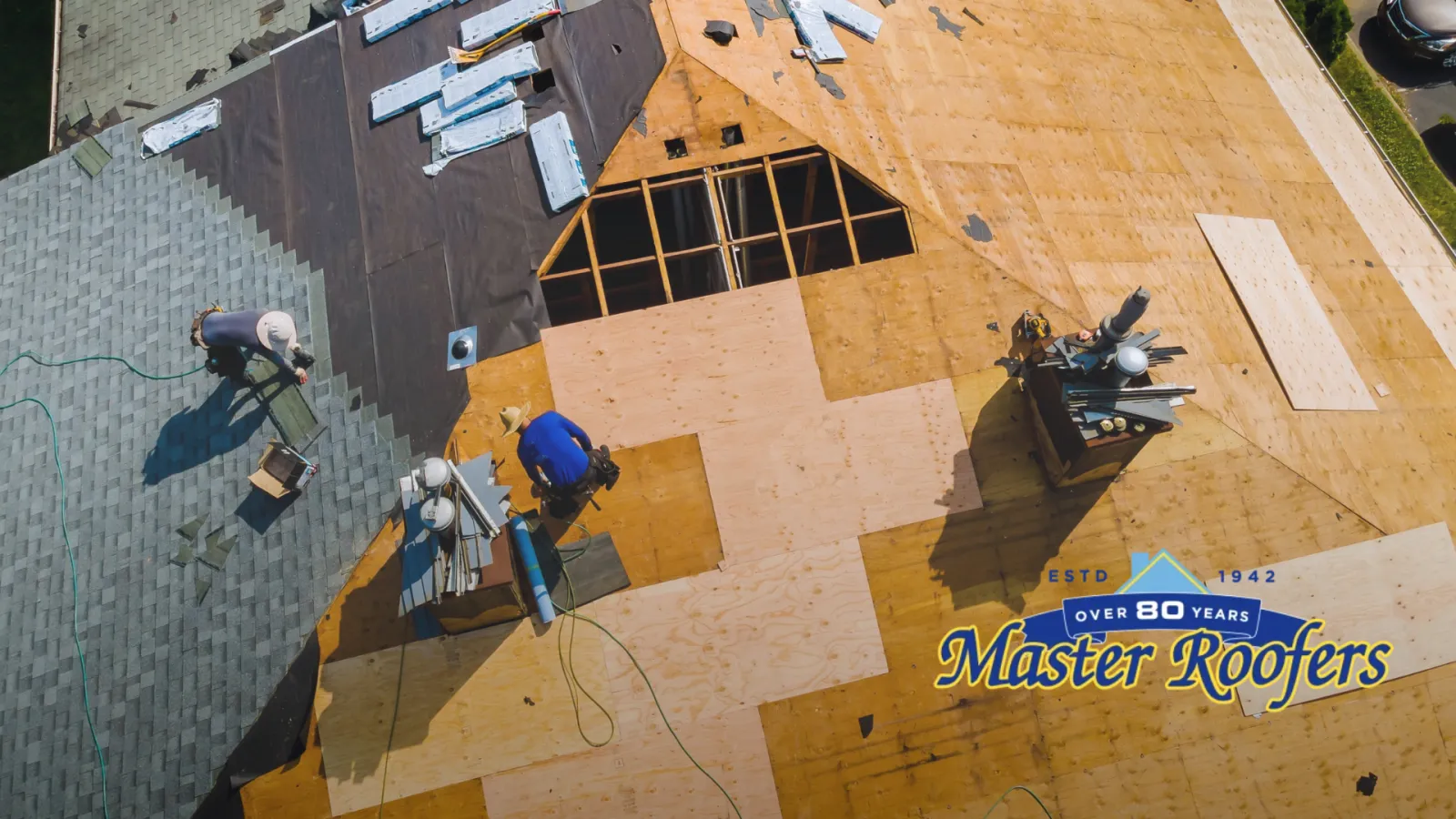In this episode, John Maher speaks with Brett Rogenski, general manager of Master Roofers, about the important questions homeowners should ask before hiring a roofing contractor. Brett highlights common mistakes, such as not verifying insurance, certifications, and warranties, and explains how these factors are crucial in selecting a trustworthy contractor. He also discusses the importance of working with specialized roofing professionals rather than general contractors. Master Roofers, with over 80 years of experience, emphasizes transparency, high-quality materials, and certified workmanship to deliver lasting results for homeowners.
John Maher: Hi, I am John Maher and I'm here today with Brett
Rogenski, general manager of Master Roofers, the most trusted roofing company
in New Hampshire for over 80 years. Today we're talking about questions to ask
before you choose a roofing contractor. Welcome, Brett.
Brett Rogenski: Thanks, John. I appreciate you having me today.
What are Common Mistakes Made
when Choosing a Roofing Contractor?
Maher: Yeah, sure. So Brett, what are some of the most common mistakes
that homeowners make when they're choosing a roofing contractor?
Rogenski: You know what? That's a great question. The home
improvement contractor industry is one that doesn't honestly have a great
reputation. And that is because there are certain... I shouldn't say the
homeowner doesn't make mistakes, it's just that maybe they don't know to ask
all the right questions. So, I would tell you some of the biggest things are
that people have challenges with our comparing warranties, manufacturer
certifications, financing.
In the case of roofing, roof inspections and that sort of
thing. So some of the most common mistakes are, just assuming that everyone
that says they're a roofer is a roofer. For an example, Master Roofers, this is
all we do. We do roofing, we do skylights. That's it. We won't build you a
deck, we won't replace your windows, we're not going to reside your home for
you, we are roofers.
I think if you look at a lot of other people out there, a
lot of other folks, they are what you would refer to as just general
contractors, and they're putting down flooring today and they may be residing a
house tomorrow, and they needed another job because they had an open spot and
they're building a deck the week after that. And then they're telling you that
they're qualified to put your roof on your house after that. And I would tell
you that it's very hard to be a jack of all trades and a master of them at the
same time. So again, at Master Roofers, we do one thing and we want to do it
the very best that anyone could ever hope for and that's roofing. Residential,
commercial, and skylights of course.
Do You Specialize in Roofing?
Maher: Right? So asking your contractor, "Hey, do you specialize
in roofing?" Is that all you do or do you do 10 other things also? That's
a good question to ask.
Rogenski: Yeah, that is one of the very best questions to ask. And I would also ask anyone who's seeking a roofing contractor for... We gladly provide certificates of insurance and prove that we're in good standing there. I would tell you with any contractor, you should be asking about their insurance and asking for proof of it. Don't just let someone tell you that, "Oh yeah, I'm fully insured." I hope they are. There's a lot of folks that aren't. This is your home. If that person does not have proper insurance and someone that he hired for the day is up on your roof and falls off, unfortunately if that contractor doesn't have proper insurance, that now becomes your problem as the homeowner.
How Do You Know if a Roofing
Contractor is Insured?
Maher: Right. So how do you figure that out? Are you looking for
something in particular with the insurance? You just looking to get proof, like
you said, that they are insured. Does it have to be from a particular insurance
company or anything like that?
Rogenski: No, you just want to get what's called, you just want to
get a valid up-to-date, properly dated certificate of insurance. And if you
say, "Hey, provide me with your COI, certificate of insurance", any
reputable company within 24 hours, probably sooner, we'll be able to email that
over to you and it'll show that they have proper liability insurance, workers'
comp insurance, all that stuff, and their limitations and that sort of thing.
If they can't produce that, there's probably a reason.
So, it just proves that they're doing that because you
shouldn't have to pay someone and then take on the liability of what if someone
gets injured on this or if they do damage to your home. So you hire a
non-licensed contractor or someone that doesn't have proper insurance and they
get halfway through a job and now they've screwed up your home and they go
away, Your insurance company isn't really interested in fixing that, because
this isn't an act of God or something.
This is, you hired an uncertified contractor. Wow, it
looks like you got a problem, John. That's what it is. So you don't want to put
yourself in that. I would also tell you that manufacturer certifications are
key. Manufacturers want to maintain their good name as well. So you should have
someone present you with a valid, they all produce certificates that show a
company is certified and to what level. And those are dated certificates good
from date X to date Y.
So, you would want to say, "Hey, you know what? Can
you show me your manufacturer certification?" In the case of Master
Roofers, we have several certifications. The one that we are most, I guess I
would say most proud of is our GAF Master Elite Roofing Contractor
certification, because those are only awarded to less than 2% of roofing
contractors in North America. And that's GAF saying that we've received
sufficient training to qualify, and by the way, that's their top level.
We've received sufficient training and we've also
demonstrated to them that we follow their assembly systems, that we're a
quality company. It's not just about do you put on a good roof? It's about
customer satisfaction and other things. So we put the roof on the way they want
it to, they've come and inspected it. We've trained our people and we continue
to train them. And that's a separator. What I would tell you is that, any
company worth at salt should be able to provide you with that manufacturer certification,
showing that's current. Showing that, "Hey, they are in great standing
with that manufacturer."
Do Roofing Contractors Have
to be Licensed?
Maher: So right. You mentioned licensing as well. Do you just need to
be a licensed contractor or is there a specific roofing license that you can
get or anything like that?
Rogenski: That's a little different in different spaces. So, we
serve New Hampshire, Southern Maine, and then we serve the North Shore of
Massachusetts. A little different requirement in each space, to be honest with
you. In New Hampshire, there's really not a requirement as a contractor or
roofer unless you get into larger commercial items. But for a standard
homeowner, and that's part of the challenge with the industry is that,
"Hey, you own a truck and a hammer, you can be a roofer." Suddenly
I'm a roofer. And that sort of thing. So in New Hampshire, there aren't many
restrictions or barriers to entry to letting someone calling themselves a
roofer and that sort of thing. So hence why you want to rely on those
manufacturer certifications and stuff like that.
In Massachusetts, absolutely there's some limitations
around, you should always be working with a licensed home improvement
contractor. And they should also have... They typically have someone on their
staff that is a licensed contractor as well. So there's different levels in
Massachusetts for that, but the business itself should be a home improvement
contractor, licensed with the state, and then to be doing roofing. There's a
couple different licensure levels that someone in the company must have as well.
Maine is a little more like New Hampshire, that it's not as heavily regulated.
But again, you want to be working with someone that you know is a solid
business entity, a licensed contractor in that state.
Is it Worth Checking to See
if a Contractor is Licensed?
Maher: Is it worth, if you were to say in New Hampshire, is it worth
checking with your contractor to see if they are licensed, say in
Massachusetts, knowing that the barrier to entry is a little higher there, and
if they're licensed in Massachusetts, then that probably means that they've hit
that level?
Rogenski: I would tell you, you, it doesn't hurt. There are going
to be some people who don't serve that area, doesn't mean that they're not a
good contractor, doesn't mean they are a good contractor. But certainly I would
tell you someone that meets the requirements of Massachusetts, that's probably
a green flag that they're at least a little more solid business entity. Then
again, in New Hampshire, we don't have very many barriers to entry at all.
Someone sticks a magnetic sign on the side of their truck and says they're a
roofer. I guess they're a roofer.
Do All Contractors Offer the
Same Warranties?
Maher: Right. What about warranties and guarantees? If you're choosing
between one contractor and another, should you be looking at those warranties
and guarantees and how do you tell the difference between them?
Rogenski: A million percent. That is probably one of the biggest
separators out there. So again, the people who are going to be able to offer
you good solid warranties are going to have to be manufacturer certified. So
that's part of the reason that you want that, see a copy of that certification.
Anyone can walk into your home and tell you they're going to do a great roof
and that they're going to give you a 30-year warranty. Do they even have the
authority to do that? Are they certified by the manufacturer to be able to even
do that?
So at Master Roofers, we provide a 10-year workmanship
warranty on all of our products. Okay. So that's just our standard, having been
here since 1942. So 82 years in business, anyone who does work with us is going
to get that 10-year warranty coming straight out of the gate. And then we can
provide... Again, I'll focus on GAF, although we work with all manufacturers.
With GAF because of our status as a master elite contractor, we can offer
warranties on certain systems of up to 50 years, and we provide that to you in
writing. You get a copy of the warranty once our work is completed, and that
warranty is registered with GAF. So don't just take someone's word for it, make
them show you that they are eligible to provide you that warranty. And once the
work is done, make sure you get a copy of that warranty.
Unfortunately, we've met some folks who, someone promised
them a 30-year warranty and now they're not answering the phone. And then they
reach out to the manufacturer and the manufacturer doesn't know anything about
it. And so suddenly now the contractor is gone. There was never an actual
warranty. Registered customer has no real recourse at that point. Because the
manufacturer had it been registered, would be happy to stand behind it. But it
turns out the contractor, they just headed down to Home Depot, threw some
shingles on the truck, put them on, and now they're gone, and that was it. So
you want to avoid that, obviously.
What are Some Red Flags when
Choosing a Roofing Contractor?
Maher: Right. What are some of the red flags that homeowners should
look for when they're getting quotes from multiple roofing companies and
they're trying to compare one to the other?
Rogenski: Yeah, there's a lot of things. So I like to talk a
little bit about the home improvement industry from that. It's an interesting
industry. So there are very few companies like Master Roofers who've been in
business for decades and decades. So again, we've got 82 years of experience.
We're not worried about being here next year or the year after that. We're
worried about the next 82 years. We're sitting around going, "So what's
our centennial celebration going to look like?"
And home improvement contractors are ranked in the top
five of consumer complaints by the Better Business Bureau, unfortunately.
There's a lot of little companies out there. Something I would share with you
is that there's a 96% failure rate of all home improvement contractors within
the first five years of business. So a 100 companies open up in New Hampshire
this year as home improvement contractors five years from now, 96 of them are
defunct and gone. And only four of them are still in existence. And then you've
got the question of, are they thriving or are they surviving?
So, I guess what I would tell you is, things that I would
look at to have the best experience are manufacturer's certifications. Length
of service. One of the biggest things that is a separator for companies is, how
long have they been in business? Who are they affiliated with? And can they
prove all of that? So again, a company that's been doing business for decades
is going to be more financially stable. They're going to be there to serve you
tomorrow, all those things, as opposed to a guy who just bought a white van and
got in business last week. So, those are some things. So, the ability to offer
warranties, the ability to prove proper insurance, the ability to prove proper
certifications with the manufacturers. And again, that ability to be there
tomorrow.
Is Quality More Important
than Price for Roofing Contractors?
Maher: And do you think looking at all of those things is much more
important than just looking at the dollar amounts of the quotes? And sometimes
people say, "Oh, just pick the middle one. It's not the cheapest one, it's
not the most expensive one. Go with the middle quote."
Rogenski: Absolutely. It's funny you mentioned that because I
think that's become the default of the world and it's become a little bit
outmoded that, "Okay, I'm going to get three quotes." So most of us
are not professional quote getters. That's not our day job. We haven't been
spending decades honing our skills on getting quotes. And a lot of times we're
reacting to something. So all of a sudden now we're having a leak in our roof
or some other problem. It's not like we've been planning this for months and
years. So we're reacting to a situation. The old default used to be go get
three quotes, throw out the bottom one because they must be too cheap for a
reason. Throw out the top one because I don't know, someone thinks you're
trying to gouge them and just go with the middle one. I would tell you to look
at it a little different way. Set price aside and look at qualifications first.
Again, you may get... I would look at it more as value. I
guess that's how I would say it is, "What am I getting for that
investment? I'm getting a guy in a van that's been in business for six months
and he has no certifications. He can't show me his insurance and that sort of
stuff, but he's cheap." I would look at the value of what you're getting
in a proposal and look at price last. Look at, are these people qualified,
first of all, and then use that as a detractor and go, "You know what? I'm
not comfortable working with someone who's only been in business for three
years."
I'm not comfortable working with someone who doesn't have
that certification from the manufacturer. I'm not comfortable working with
someone who can't provide me proper insurance, and the ability to give me
warranties", exclude those people first. Now you're into the more, at
least professional class, and then you can compare, "Okay, now what's the
difference between Master Roofers and Joe's Roofing and Tacos?"
"Okay, these guys are master elite certified. They've
been in business 82 years", and you can compare and go, "Well, what's
that actually worth to me?" And a lot of times that's... You go,
"Well, someone might be X percentage higher, but I really feel like I'm
getting a lot more mileage out of that." So better value proposition.
Maher: All right, well that's really great advice, Brett. Thanks again
for speaking with me today.
Rogenski: Thank you very much for having me.
Information About Master
Roofers
Maher: And for more information, you can visit the website at masterroofers.com
or call 603-623-4973.


